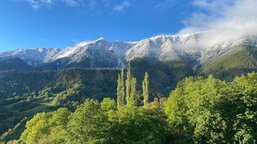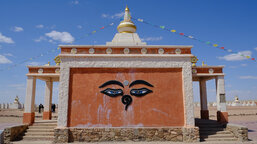Moldova is a small country between its big neighbours, Romania and Ukraine. 2.6 million people live here, and we mostly hear about Moldova in connection with Russia's growing influence in the region. But Moldova also has good wine or a Czech village. Let's get to know a few interesting facts you will not find in the news.
1. You can visit a Czech village in Moldova
The small village of Huluboaia in the southern part of Moldova was founded in the late 19th century by a group of 153 Czechs. Today, only a few locals speak Czech, but a group of volunteers visit every summer to promote Czech language education and revive Czech customs and traditions.
2. Moldova is the least visited country in Europe
Only 11,000 tourists visit Moldova every year. This is probably due to its location and the few tourist attractions, but those who have visited Moldova are always happy to return. The Orheiul Vechi monastery complex, carved into the rock by monks in the 13th century, is worth a visit. The best time to visit the country is the wine harvest season in October when many wine festivals are held.
"You will not find a lot of historical monuments or breathtaking nature in Moldova, but the great hospitality of the locals will make up for it. The local cuisine is definitely worth trying," says Lucie Jašová, Communication Officer at Caritas Czech Republic, who visited Moldova this year.
3. The most extensive wine cellars are located in Mileștii Mici
Winemaking has a great tradition in Moldova and is one of the leading industries. Moldovans mainly grow white wine, and there are still interesting native varieties to be found.
The wine cellars in the village of Mileștii Mici have the most extensive collection of wines and have made it into the Guinness Book of Records, with almost 2 million bottles stored here. The entire length of the cellars is 250 km, but today only about 120 km are used.
4. Chișinău has one of the largest Jewish cemeteries in Europe
Before World War II, Moldova had one of the largest Jewish populations. Over 60,000 were killed during the Holocaust, and more than 20,000 were buried in the cemetery in Chișinău. The cemetery itself was founded in the 17th century. During the 20th century, however, it had to retreat from its original size - in 1958, part of it was closed for road construction, and in 1961 for a park and tennis court.
5. Special bath for newborns
The arrival of a new family member is celebrated traditionally in Moldova. It is customary for the baby to be bathed for the first time by the eldest woman on the father's side. Apart from water, they add flowers (for a nice life), honey and milk (to give the baby a sweet life) and money.
6. Moldova is a paradise for nut lovers
Moldova is one of the world's largest exporters of walnuts. The local climate and soil conditions are ideal for growing walnuts. They are widely used in the local cuisine, and sweet cakes with walnut filling are very popular.
7. There is only one UNESCO World Heritage Site in Moldova
The Struve Geodetic Arc is a chain of survey triangulations stretching from the north of Norway to the Black Sea. It was built by the Russian astronomer von Struve to determine the exact dimensions of the earth by the meridian. Its total length is over 2,820 kilometres.
8. Moldova is a transit country for refugees
After the Ukraine conflict outbreak in February 2022, Moldova has become a country through which large numbers of refugees continue to reach safety. More than 700,000 people have already crossed Moldova's borders. Some refugees remain in Moldova, mainly to be closer to their home in Ukraine. Moldova is currently hosting about 100,000 refugees.
9. Caritas Czech Republic supports refugees in Moldova as well as local health and social services
Moldova is the poorest country in Europe, and the dire economic situation and high unemployment force many locals to move abroad. This leaves mainly elderly people in the country without one to look after them. We help provide health and social services for these people and have already opened 11 home care centres. We are also introducing telemedicine in Moldova to offer health services to people living in remote areas. Since the start of the Ukraine war, we have provided basic needs for refugees in Moldova; we equipped refugee centres and distributed immediate financial assistance.
We are able to help lonely seniors, refugees and other people in Moldova thanks to the support of our donors. Join us and help with us.













